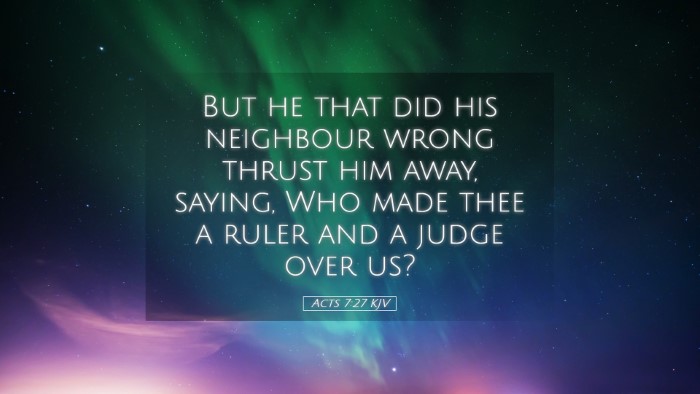Commentary on Acts 7:27
Acts 7:27 states, "But he that did his neighbor wrong thrust him away, saying, Who made thee a ruler and a judge over us?" This verse is essential in understanding the early struggles faced by Moses and highlights the theme of rejection that reverberates throughout biblical history.
Contextual Background
The context of this verse is crucial for a comprehensive understanding. Stephen, in his defense before the Sanhedrin, recounts the history of Israel and the calling of Moses. Here, he highlights the rejection Moses faced early in his life as he attempted to intervene on behalf of his oppressed brethren.
Insights from Matthew Henry
Matthew Henry points out that Moses, despite his noble intentions to aid his people, faced immediate rejection. The harsh response of the Israelite, who questioned Moses' authority, underscores a significant theme: the prophetic role often comes with misunderstanding and hostility.
- Human Rejection: Henry emphasizes that Moses was indeed called by God to deliver Israel, yet his people did not recognize or accept him initially. This mirrors the rejection that Jesus faced in the New Testament.
- Leadership Challenges: The outcry of "Who made thee a ruler?" reflects the skepticism that leaders often confront. It raises the question of divine authority versus human approval.
Insights from Albert Barnes
Albert Barnes highlights the significance of this verse in illustrating the hardness of the human heart. He notes that the Israelites, physically oppressed, were spiritually indifferent and failed to recognize their true deliverer.
- Spiritual Blindness: Barnes asserts that even amidst dire circumstances, people can remain unmoved to divine intervention. This serves as a warning about the dangers of spiritual complacency.
- Divine Timing: He discusses the importance of God's timing in the raising of Moses as a leader. Although he was not initially accepted, God used this rejection to shape Moses’ character and mission.
Insights from Adam Clarke
Adam Clarke elaborates on the historical and cultural context of this event. He notes that the relationship between the Egyptians and Israelites was fraught with tension, further complicating Moses' efforts to be recognized as a savior figure.
- Conflict of Identity: Clarke discusses how Moses grew up in the Egyptian palace but was disowned by his heritage when he attempted to stand up for his fellow Israelites. This internal conflict plays a profile of the struggle of many leaders.
- Recognition of Authority: He also emphasizes the implications of rejecting Moses' authority as a leader, suggesting that rejection of God’s chosen often leads to severe consequences for the community.
Theological Implications
The rejection of Moses serves as a precursor to the ultimate rejection Christ faced. This moment in Acts reveals a pattern in God’s plan: leaders chosen by God are often rejected by the people they are called to serve.
- Prophetic Rejection: This theme extends beyond Moses and resonates with prophets and apostles throughout Scripture, culminating in the ultimate rejection of Jesus Christ.
- Expectation of Recognition: The church must grapple with the reality that divine calling does not guarantee acceptance or recognition from humanity.
Exhortations for Pastors and Leaders
For pastors and church leaders, Acts 7:27 reminds us that rejection can be part of the calling. It calls for resilience and reliance on God's confirmation of one's leadership.
- Stay True to the Calling: Leaders should remain steadfast in their divine appointments even when facing challenges and opposition.
- Empathy in Leadership: Understand that those we seek to help may not always recognize our intentions. Cultivating patience and understanding is vital.
Conclusion
Acts 7:27 provides a profound insight into the complex relationship between divinely appointed leaders and the people they serve. Gathered insights from the public domain commentaries of Matthew Henry, Albert Barnes, and Adam Clarke offer invaluable lessons in leadership, recognition, and the challenges posed by human indifference.
As believers study this passage, let it inspire commitment, understanding, and a reminder of the often-painful road leaders may navigate in faithfully fulfilling God's purpose.


